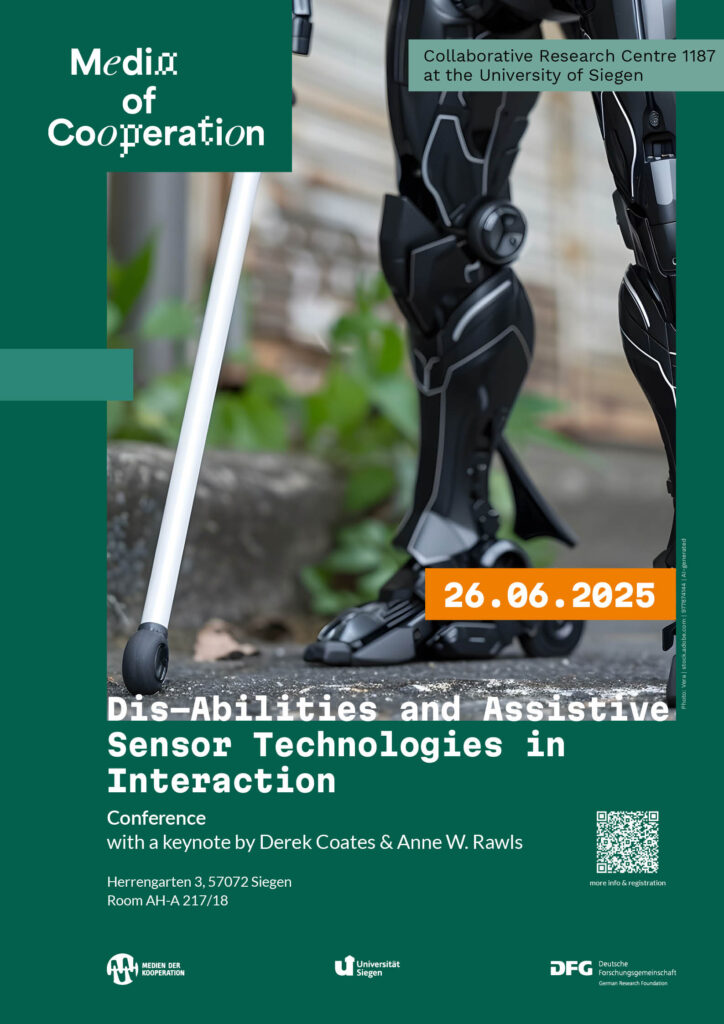|
Pre-Conference Workshop June 25, 2025 |
| 16:00 – 18:00 |
Re-visiting ethnomethodological Studies of Disabilities – Manuscript discussion: “Doing a chemical experiment” (1980) |
| 19:00 |
Informal get together – Dinner at Namaste India, Markt 47-49, 57072 Siegen
|
|
|
|
|
Conference June 26, 2025
|
|
| 09:30 – 09:45 |
Get together & Welcome
|
| 09:45 – 10:00 |
Introduction (Lorenza Mondada & Clemens Eisenmann) |
| 10:00 – 11:00 |
“Navigating Social Spaces: Powered Wheelchairs in Interaction” (Gitte Rasmussen)
|
| 11:15 – 12:15 |
“Enabling the person with aphasia to speak: the role of the speech-therapist’s bodily and sensorial resources” (Sara Merlino) |
| 12:15 – 13:45 |
Lunch (mensa)
|
| 13:45 – 14:45 |
“Unframing Critique? Dis-Ability as a Heuristic” (Philippe Sormani & Puneet Jain) |
| 15:00 – 16:00 |
“Sensorial Inversions: Tutorial Problems” (Lorenza Mondada, Clemens Eisenmann, Philippe Sormani) |
| 16:00 – 16:30 |
Coffee
|
| 16:30 – 17:00 |
“Discussion” (Michael Lynch, Christian Meyer & Erhard Schüttpelz) |
| 17:00 – 18:30 |
“Sighted Interaction Orders: How Tacit Interactional Preferences that Assume Sight Stigmatize Legally-Blind People” (Keynote) Derek Coates and Anne W. Rawls |
| 19:00 |
Conference Dinner at Brasserie Ristorante e Piazza, Unteres Schloß 1, 57072 Siegen |
Abstract:
This conference addresses the interfacing of sensor-driven assistive technologies with embodied multisensoriality in interaction, investigating how and when Dis-Abilities are established and made relevant, as well as questioned or maintained within social practices and interaction orders. Drawing on Critical Disability Studies as well as on Conversation Analysis and Ethnomethodology, the conference aims at approaching “disabling worlds” in social, political, cultural as well as praxeological terms, instead of reproducing stereotypes and medical ascriptions of physical deficiencies to individuals – considering that, still, “disability remains a contested concept” (Seale 2024). Against this background, assistive technology (AT), and assistive sensor technologies in particular, play an ambivalent role in everyday practices between enabling participation and reifying marginalization, by promising to improve a person’s “functional capabilities,” while oftentimes relying on deficit models of interaction and technology for doing so. While other tensions might be mentioned (e.g., “specialist” versus “mainstream” technologies), alternative models should be considered as well, and be embedded in political agendas and infrastructural improvements (e.g., discussing “universal design,” enabling “access for all”). The conference invites empirical studies and theoretical re-specification of disabilities in interaction by viewing AT as “media of cooperation.” Just how do these media rely on embodied sensorial practices? And how are they ongoingly accomplished in social interaction? How does the body itself become a media of cooperation? To tackle these and related questions, the conference takes its cue from current research in ethnomethodological and conversation analytical studies of asymmetric and “atypical” interactions. Homing in on “sensing issues” in and around, if not against AT and assistive sensor (and action-enabling) technologies, the conference brings together a range of empirical studies to revisit and relocate – in short, respecify – the indicated issues, outlined ambivalences, lingering problems, and possible solutions.

Venue
Campus Herrengarten
AH-A 217/18
Herrengarten 3
57072 Siegen